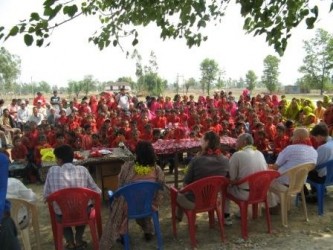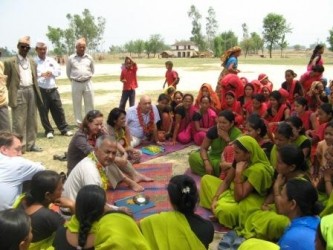Last week I took my first trip outside Kathmandu and flew to Nepalgunj. Nepalgunj is in the Terai. This is a very different part of the country - and is a world away from the popular image people have of Nepal. Not a mountain in sight - instead there are hot, dry and dusty plains, very much like the northern plains of India, which is not surprising given that Nepalgunj is about 7km from the border of Uttar Pradesh, and only 150m above sea level.

It was a fascinating visit, but from a raft of impressions from the visit, what I wanted to write about was the women I met. When I went to open the new primary school that DFID had helped the community to build, the whole local community was there, about 200 people. Among these were about 70 women, mostly mothers of the children at the school. They had been involved in the school building, and were also involved in local credit schemes. Take a look at the Community Support Programme website to find out more.
There were three groups of women, all in matching saris depending on which group they belonged to: Red, pink or green. There was a sense of pride and solidarity in their "uniforms" and they stuck together in their groups throughout the whole inauguration ceremony and afterwards.
I wanted to know more about their credit groups. They were very organised. Only married women can belong, as they did not want an unmarried woman joining, taking out a loan, and then moving away because she had married and would go to live with her husband's family (possibly in another district) as is the custom here. They each contributed 61 Nepalese Rupees (NRs) a month to the kitty - this is about 50p. I asked why 61, not 60 and was told that 60 goes into the kitty and the 1 rupee goes towards stationary and running costs of the group. Very organised!
Most of the time the loans are between NRs 10-40,000 (£80 - £325), and are used to open small shops or to grow vegetables (to buy seeds and implements etc). We asked if they ever took loans to pay for a wedding or a dowry and they were shocked at such frivolous ideas! We asked what they did with the extra money the shops or vegetables brought in, but they were quite reticent about telling us. Studies of such credit groups show that additional income is usually used to supplement the food of the family, primarily the children, or to help pay for schooling. Perhaps if there is a little spare, they may buy a new sari, but they were not going to say that in front of the men of the community who were watching and listening closely!

And then something happened which has really stuck in my mind: I asked about safety, as the Terai can be a very dangerous place with criminal gangs controlling some areas. One group admitted they had once been robbed on the way to deposit money in the bank, so I suggested they should ask the men to accompany them, to provide additional security. They laughed at this idea and one woman explained that the men were not interested and did not support the women in what they were doing (even though at least indirectly they would also be getting the benefit of the increased income). At this, an older man stepped forward and shouted at the women - how dare they say such things, and how dare they say such things to foreigners! The effect was instantaneous and from a group of proud, confident women, they were suddenly more cowed, much more cautious. The discussion finished shortly afterwards.
The incident really underlined again for me the position that many women have in society here. Despite great progress in some areas, many women in Nepal, particularly rural women, still have a rough deal. Land is generally inherited from the father to the son, so women have much greater economic insecurity than men. A recent study showed that only 11 % of households had any land in female ownership, and only 7 % reported ownership of livestock. Somewhat surprising given that 72 % of women work in agriculture (compared to 48 % of men), and earn considerably less doing so - an average daily wage of NRs 47 (38p) per day compared to the male average of NRs 63 (51p). This has an impact on the whole family, in Nepal around 50% of children are malnourished, and over 40% of adult women are too. Women eat last, eat the least and eat the worst food. It means their children are born malnourished and their future is permanently blighted. The low status of women is a key part of this problem.
But things are changing. I work in an office which has a good number of strong, dynamic Nepalese women, who are clearly the equal of their male counterparts. 33% of seats in the Nepalese Parliament are occupied by women - the highest number of women parliamentarians in South Asia. This compares favourably to the UK which stands at 19% or the US at just under 17%. And these women are beginning to make their mark. But these are educated and mostly urban women, and the impact of these favourable changes need to be felt more among poorer women too. That's why the programmes that we have on health, education, skills development and empowerment are so very important not only for the women I met last week, but for the next generation of women, girls and boys here in Nepal.

4 comments
Comment by Women and their place at Blogbharti posted on
[...] Sarah Sanyahumbi meets some self-help groups in Nepal and is witness to an incident which really underlined again for her ‘the position that many women have in society’: And then something happened which has really stuck in my mind: I asked about safety, as the Terai can be a very dangerous place with criminal gangs controlling some areas. One group admitted they had once been robbed on the way to deposit money in the bank, so I suggested they should ask the men to accompany them, to provide additional security. They laughed at this idea and one woman explained that the men were not interested and did not support the women in what they were doing (even though at least indirectly they would also be getting the benefit of the increased income). At this, an older man stepped forward and shouted at the women - how dare they say such things, and how dare they say such things to foreigners! Linked by kuffir. Join Blogbharti facebook group. [...]
Comment by sujan posted on
Namaste..
Sarah; already reach the outline map of Nepal (great). health in himalayas, women & children-in terai and workplace in ktm. Within 5 week and 1 days you visit Nepal, interesting (I love it).. and we are very thankful to mike and UK’s etc. We hope that you’ll take the good leadership role for a multi-change in Nepal.
S
Comment by Hari Nath Yogi posted on
Thank you very much Sahara. Indeed you have encountered with real condition of women of Nepal whose condition is really meagre and pathetic though their size is more than 50% in whole population size. I think the condition of Nepal will not improve if the condition of Nepalese women is not uplifted. So I also feel very sad to see these condition of our kind hearted mothers. Please Sahara lead your effective leadership with some magical vision to change this situation. I am also with you being conscious citizen.
Hari,
Comment by sdsg posted on
Having toured and volunteered in Nepal 10 years ago, I was surprised and saddened that no one appreciates the obvious relationship between how improving women's equality would further improve the collective strength of the people of Nepal.